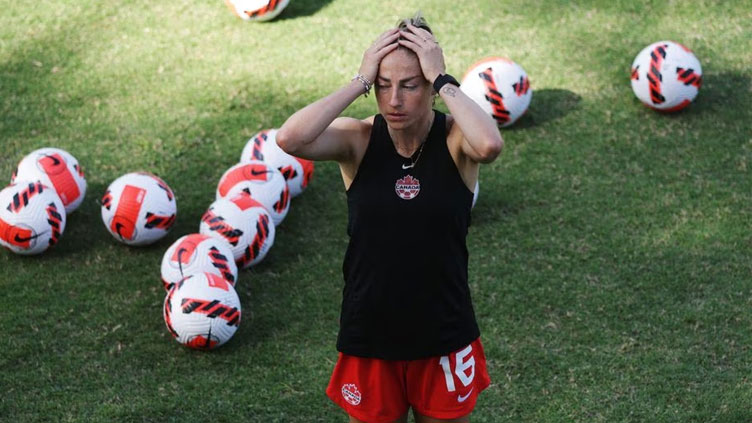Canada's Beckie calls for better funding and research to tackle injury crisis in women's game

Sports
The 28-year-old is among a group of players who will miss Women's World Cup that kicks off in July
MANCHESTER, England (Reuters) - Canada and Portland Thorns forward Janine Beckie has joined the growing chorus calling for better research into the prevalence of injuries in women's soccer, saying that alarm bells would ring if their male counterparts were suffering the same fate.
The 28-year-old, who helped Canada capture gold at the 2020 Tokyo Olympics, is among a group of players who will miss the Women's World Cup that kicks off on July 20 after tearing the anterior cruciate ligament in her knee.
England captain and Arsenal centre-back Leah Williamson last week became the latest marquee player - and third for Arsenal this season along with Beth Mead and Vivianne Miedema - to rupture an ACL.
Spain's Ballon d'Or winner Alexia Putellas, Simone Magill of Northern Ireland and France striker Marie-Antoinette Katoto have also damaged ACLs in the past year.
"I do believe that if the same thing happened even with Arsenal's men's side with probably their three best players, that should be enough for a: 'Why is this happening? Look into this,'" Beckie told Reuters.
"I think that a lot of people have boiled it down for so long to 'Oh, it's just more common in women, and a common injury in women's soccer.' but it seems like there's been this massive jump in the amount that it's happening now. I don't know what the reason is but someone needs to figure it out."
Studies have found women in sports that involve sudden deceleration or changing direction such as soccer are up to six times more likely to suffer an ACL injury than men. Part of the problem is that there is no gender-specific research into the issue, said Alex Culvin of global players' union FIFPRO.
"Women are often viewed as little men, if you like, and the critical factors are not assessed through a gender-specific lens," said Culvin, FIFPRO's senior coordinator, policy and strategic relations. "The data that does exist doesn't pertain actually to women."
Surgeon Stephen Guy, who specialises in sports knee injuries, said the issue is complex and multifaceted. He said the injury could be caused by a number of things, including muscle fatigue and anatomical differences such as a wider pelvis on women relative to leg length, and changing hormones during the women's menstrual cycle.
There are also psychosocial factors, he suggested, such as equal access to "the best facilities, the best coaches, the best rehab... you saw in the World Cup the male footballers getting on a first-class, huge plane. Probably all these things make a difference, and they are slightly disgraceful."
Culvin agreed, using the example of physiotherapists. Will the best go to the professional men's team, where the salary is well into six figures, or the women's side for a fraction of that? "If the knowledge base around players is not of an elite standard, of course players are going to fall through the cracks," she said.
Culvin said that FIFA has published research-based information on ACL prevention, including warm-up exercises. "You can lead a horse to water but you can't force her to drink," she said.
"If that information isn't being imbedded into clubs and the leagues aren't being held accountable to protect the health and safety of their players, that's where the gap exists and that's a big problem."
Beckie, who underwent surgery a month ago and just received the green light to start walking, said female players are conditioned to accept the gap in resources. The difference is amplified, she added, by the fact women are facing increasingly busy game schedules.
"You've changed the schedule to mimic the men yet you're not giving the female players the same level of resources," she said. "Premier League players are playing 40, 50- plus games a season and are able to maintain fitness levels because they're treated like gold, which they should be.
"If you're going ask an elite athlete to play 50 games a season, you've got provide them the top-of-the-line care."

